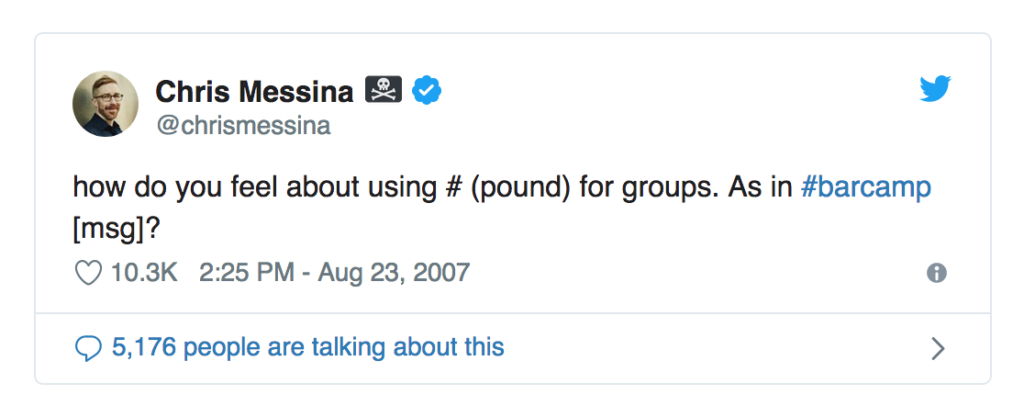
Hashtags are the new way of communicating online. With 700 million people using Instagram every month, hashtags group conversations and topics together. Are #hashtags obnoxious and outdated (see GIF above) or actually promote engagement and promote your business? #waitforit #legendary
What’s a hashtag anyway?
Hashtags came about “when Twitter began to use the hashtag as a method of indexing keywords to help facilitate good search results for it. Since then, most every social media site has been leveraging hashtags for that same purpose.” Chris Messina suggested using the pound symbol in 2007 as a way to search groups talking about a specific topic, in his case, #barcamp.

Stunning Strategy breaks down the three ways hashtags are used:
- [To] Spread information — Hashtags have played a huge role in connecting people in the Me Too, Black Lives Matter and other social movements.
- Help others get the information they need — In the case of natural disasters — or even man-made destruction — hashtags are a way to quickly disseminate information related to where people can seek shelter, get medical help or access clean water.
- Find other like-minded people — Hashtags are a way to label ourselves online, so whether you’re looking to share your funny blunder years’ photo through a #TBT or connect with others in your city by using #yourcityname, it’s a great way to document who you are, where you are and what you stand for.
What does this mean for your business? Studies have shown that (particularly on Instagram) relevant hashtags increase the engagement of your audience with your topic. The key here is to use relevant and not just popular hashtags to grow your business.
Some tips on using hashtags:
Determine What Hashtags are Relevant to Your Business
As you are scrolling through your feed, notice which popular hashtags you could use for your posts. It may help to determine the voice of your company – is it more formal or casual? What kind of content do your followers post? All these are questions that should be answered in order to tailor your hashtags to your images. If, for example, you own a bed and breakfast, look for what others are posting and which hashtags they are using. Capitalize on news events and holidays by celebrating #nationalpancakeday or #fallbreak as a way to bring followers to your profile. A note of warning: use only hashtags that are relevant to your picture. Users (especially on IG) will pick up on the fact that you are using hashtags in order to gain views and engagement and that can damage your company’s reputation.
Use the Right Amount of Hashtags
Many social media marketers weigh in on this topic but there are at least two schools of thought:
- Instagram allows up to 30 hashtags. While some marketers claim that it could look like spam to viewers, others swear by the results. Louise Myers is in this camp and includes her research/strategy for using 30 hashtags on her website.
- Others like Creatively Squared, suggest using 8-11 highly engaging hashtags to be most effective.
Ultimately, it comes down to what will work best for your business. Keep in mind that using at least 11 hashtags promotes engagement by 79.5% per 1K followers as opposed to 18% for posts zero hashtags.
Use Tools to Find the Perfect Hashtags for Your Post

If you need help coming up with a hashtag for your post or even want to see what’s trending, try these tools:
• Ritetag– This is a free tool that allows you to see what’s trending on Instagram and Twitter
• Hashtagifyme– This tool allows you to search different keywords throughout Twitter and Instagram and see the top influencers for that keyword.
• The Native Platform – Search the platform you are using for hashtags that are popular and being used the most. For a comprehensive guide to selecting hashtags for each major platform (Instagram, Twitter, LinkedIn and Facebook) head over to Hootsuite.
Your #wednesdaywisdom this week is that yes, hashtags promote engagement when used often and in ways that are relevant for your business. Look at you! You’re #winning.
Author, Laura V. Boston
The C3 Group
